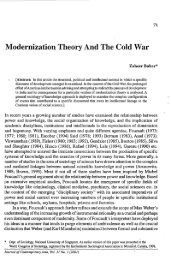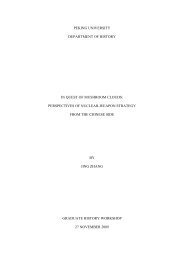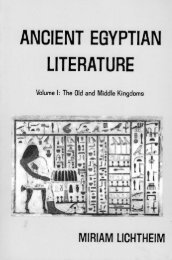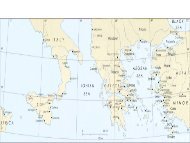Antonis Liakos Greece and Hellenism What is to be Greek? Two ...
Antonis Liakos Greece and Hellenism What is to be Greek? Two ...
Antonis Liakos Greece and Hellenism What is to be Greek? Two ...
- No tags were found...
You also want an ePaper? Increase the reach of your titles
YUMPU automatically turns print PDFs into web optimized ePapers that Google loves.
<strong>An<strong>to</strong>n<strong>is</strong></strong> <strong>Liakos</strong><strong>Greece</strong> <strong>and</strong> <strong>Hellen<strong>is</strong>m</strong><strong>What</strong> <strong>is</strong> <strong>to</strong> <strong>be</strong> <strong>Greek</strong>? <strong>Two</strong> poems might provide an answer. The first one <strong>is</strong> written byKost<strong>is</strong> Palamas, the poet responsible for the first Olympic games anthem in 1896.Palamas wonders 'what <strong>is</strong> my motherl<strong>and</strong>'? Is it her l<strong>and</strong>scape <strong>and</strong> monuments left<strong>be</strong>hind by all previous periods? That <strong>is</strong>, the monuments left by the ancient <strong>Greek</strong>s, theRomans, the Byzantines, the Venetians, the Ot<strong>to</strong>mans etc. In the second poem, writtenby the No<strong>be</strong>l-prize winner George Sefer<strong>is</strong> (1963), the poet descri<strong>be</strong>s <strong>Greece</strong> likesomeone who wakes up from a deep sleep holding in h<strong>is</strong> h<strong>and</strong>s an ancient marblehead, which he had dreamt h<strong>is</strong> entire life as <strong>be</strong>ing inseparable from it. However, hedoes not know what <strong>to</strong> do with it, as he <strong>is</strong> tired of holding it. In the first poem,contemporary <strong>Greece</strong> <strong>is</strong> nothing less than an amalgam of everything that <strong>to</strong>ok placefor thous<strong>and</strong> years, leaving <strong>be</strong>hind their traces on the physiognomy of the l<strong>and</strong>,including those of her conquerors. In the second poem, contemporary <strong>Greece</strong> <strong>is</strong>unable <strong>to</strong> decide her identity; instead, she swings <strong>be</strong>tween the present <strong>and</strong> antiquity,as the latter <strong>is</strong> proven un<strong>be</strong>arable for the country <strong>to</strong> obtain a contemporaryconsciousness.<strong>Greece</strong>, as a modern nation state, was the result of a revolt against the Ot<strong>to</strong>manEmpire (1821-1830). Prior <strong>to</strong> th<strong>is</strong>, it was not self-evident that the new state was <strong>to</strong> <strong>be</strong>called <strong>Greece</strong> (Hellas), nor its inhabitants <strong>Greek</strong>s (Hellenes). '<strong>Greek</strong>' in vernaculardenoted a pagan, a meaning given by the Church Fathers. In other words, Chr<strong>is</strong>tianity,after its r<strong>is</strong>e <strong>to</strong> supremacy in the Eastern Mediterranean in the fourth century, replacedold religions, as well as the culture of the old <strong>Greek</strong> city. That <strong>is</strong> the culture of publicworship, debates on public <strong>is</strong>sues at the Agora, of theatre, the wrestling arena <strong>and</strong> tha<strong>to</strong>f the Olympic games. Undeniably, th<strong>is</strong> was a sensational change. The question thatar<strong>is</strong>es on many occasions on th<strong>is</strong> <strong>is</strong>sue <strong>is</strong>: did the Hellenic world survive after the endof the antiquity?But what <strong>is</strong> the Hellenic world? Pla<strong>to</strong> descri<strong>be</strong>s the <strong>Greek</strong>s as frogs sitting around apond, meaning the <strong>Greek</strong> settlements around the Mediterranean <strong>and</strong> the Black Sea.But were the <strong>Greek</strong>s an ethnicity or were they a civilization? For Herodotus, the<strong>Greek</strong>s had a common language <strong>and</strong> religion <strong>and</strong> shared the same ances<strong>to</strong>rs.
Therefore they were one race, even if they lacked in political unity <strong>and</strong> nationalconscience. Thucydides held a more sceptic view on the <strong>is</strong>sue. He wrote, for example,that the Arcananes were initially barbarians who <strong>be</strong>came <strong>Greek</strong>s, meaning thatpreviously they solved their problems with arms as barbarians did, <strong>and</strong> not throughlaws, as the <strong>Greek</strong>s. Therefore the <strong>Greek</strong>s were a level of civilization. Anyone could<strong>be</strong> identified as <strong>Greek</strong> as long as he felt for that culture. Isocrates' perception that<strong>Greek</strong>s were those with <strong>Greek</strong> education (paideia) suggests that <strong>Hellen<strong>is</strong>m</strong> was acultural rather than an ethnic category. In the empires founded by Alex<strong>and</strong>er the Great<strong>and</strong> the Macedonians, <strong>Hellen<strong>is</strong>m</strong> encompasses mainly cultural features. Cities with<strong>Greek</strong> culture <strong>and</strong> <strong>Greek</strong> way of life extended <strong>to</strong> Central Asia. Many people who had<strong>Greek</strong> as a second language emerged as <strong>Greek</strong> writers. At the culmination of theRoman Empire, <strong>Hellen<strong>is</strong>m</strong>, through poetry, philosophy, theatre, sculpture <strong>and</strong>architecture, emerged as a culture of social d<strong>is</strong>tinction. It <strong>be</strong>came the culture of theRoman or rather Greco-Roman ar<strong>is</strong><strong>to</strong>cracy.Was there anything left from th<strong>is</strong> cultural <strong>Hellen<strong>is</strong>m</strong> after antiquity? The Chr<strong>is</strong>tiansadopted the <strong>Greek</strong> language <strong>and</strong> safeguarded a selection of philosophical <strong>and</strong> poetrytexts, as well as medical, mathematical, astronomical etc. However, they destroyed'v<strong>is</strong>ual' <strong>Hellen<strong>is</strong>m</strong>, i.e. schools of philosophy, statues, temples, theatres, <strong>and</strong> thewrestling arenas, along with everything that evolved the Agora <strong>and</strong> public debate. Inother words, the Chr<strong>is</strong>tians brought the destruction of the <strong>Greek</strong> way of life. Th<strong>is</strong> <strong>is</strong>why words like '<strong>Greek</strong>' <strong>and</strong> 'pagan' <strong>be</strong>came synonymous for Chr<strong>is</strong>tians. Nevertheless,Chr<strong>is</strong>tianity might not have acquired the form by which it <strong>is</strong> known <strong>to</strong> us, if it was notformulated by a <strong>Greek</strong> conceptual language. Then, the question that lies here <strong>is</strong>: was<strong>Hellen<strong>is</strong>m</strong> destroyed or did it survive?If we consider <strong>Hellen<strong>is</strong>m</strong> as the civilization of an era, than th<strong>is</strong> era <strong>be</strong>gan with theHellenic settlements in the Mediterranean (eighth century B.C.E.) <strong>and</strong> ended with thecomplete chr<strong>is</strong>tian<strong>is</strong>ation of the Roman Empire (sixth century C.E.). The prohibitionof the ancient worship <strong>and</strong> the Olympic games by the Byzantine emperor Justinian,<strong>and</strong> the conversion of the Parthenon <strong>to</strong> a Chr<strong>is</strong>tian church set the limits. Despite thesechanges, th<strong>is</strong> <strong>is</strong> a civilization that lasted for twelve centuries. Certainly, many culturalfeatures from the old civilization were passed on <strong>to</strong> the modern era. They survived inthe lingu<strong>is</strong>tic <strong>and</strong> conceptual background of European languages, as well as in the
languages of the Eastern Mediterranean (e.g. Coptic, Arabic, Syrian, Armenian,Slavonic, Turk<strong>is</strong>h). The dominant culture of the modern era reassessed, re-used <strong>and</strong>even more competed with <strong>Greek</strong> <strong>and</strong> Roman concepts <strong>and</strong> forms. From th<strong>is</strong>perspective, especially from the time of the Enlightenment, cultural <strong>Hellen<strong>is</strong>m</strong>emerged as a reference point in philosophy, political theory, v<strong>is</strong>ual arts <strong>and</strong>architecture. It turned in<strong>to</strong> the core of the canon of the European <strong>and</strong> largely Westerncivilization.However, <strong>Greek</strong>s <strong>to</strong>day do not see <strong>Hellen<strong>is</strong>m</strong> as a level of civilization. Needless <strong>to</strong>say, they attribute primacy <strong>to</strong> it, regarding it as a supreme civilization <strong>and</strong> the motherof the modern world civilization. Moreover, they consider <strong>Hellen<strong>is</strong>m</strong> as amanifestation of the <strong>Greek</strong> nation's brilliance <strong>and</strong> ingenuity. In other words, <strong>Greek</strong>s<strong>be</strong>lieve that <strong>Hellen<strong>is</strong>m</strong> corresponds <strong>to</strong> a nation that lived on after the end of antiquityin the Eastern part of the Roman Empire. Th<strong>is</strong> nation in its second life was co-shapedwith the Hellen<strong>is</strong>ed Eastern Orthodox Church (compared <strong>to</strong> the Latin<strong>is</strong>ed Church ofthe West). <strong>Greek</strong>s <strong>be</strong>lieve that, after the Ot<strong>to</strong>man occupation of Asia Minor <strong>and</strong> theBalkans, their nation managed <strong>to</strong> survive, re-emerge <strong>and</strong> <strong>to</strong> assert its independence inthe early nineteenth century. <strong>Greek</strong> scholars of the nineteenth-century in various waysnurtured th<strong>is</strong> notion, of an uninterrupted h<strong>is</strong><strong>to</strong>ry of a nation from <strong>Greek</strong> antiquity <strong>to</strong>the <strong>Greek</strong> kingdom in 1830. First, they archa<strong>is</strong>ed the spoken language <strong>and</strong> developeda written one as close as possible <strong>to</strong> the Hellen<strong>is</strong>tic koine. Second, they changed thenames of <strong>to</strong>ponyms; <strong>to</strong>wns, villages, mountains <strong>and</strong> <strong>is</strong>l<strong>and</strong>s regained their ancientforms. Moreover, archaeological sites (e.g. Acropol<strong>is</strong>, Delphi, Olympia, Epidauros,Mycenae, Delos, Knossos, Vergina) turned in<strong>to</strong> a geographical network of h<strong>is</strong><strong>to</strong>ricalreference sites, underlining their <strong>Greek</strong> identity. Third, they adopted a neoclassic styleas an architectural design for public <strong>and</strong> private buildings <strong>and</strong> dwellings. The samestyle was also used for national symbols <strong>and</strong> monuments. But above all, <strong>Greek</strong>scholars created a powerful narrative of a nation with a continuous h<strong>is</strong><strong>to</strong>ry fromantiquity <strong>to</strong> the present, using supporting evidence from h<strong>is</strong><strong>to</strong>riography, folklore <strong>and</strong>art h<strong>is</strong><strong>to</strong>ry. With th<strong>is</strong> notion of <strong>Hellen<strong>is</strong>m</strong>, the <strong>Greek</strong>s convinced themselves <strong>and</strong>others, not only their summer v<strong>is</strong>i<strong>to</strong>rs, but also those who study various periods oraspects of the <strong>Greek</strong> culture <strong>and</strong> civilization, in their own schools <strong>and</strong> universities.Moreover, those who were mesmer<strong>is</strong>ed by the ancient <strong>Greek</strong> civilization ass<strong>is</strong>ted withthe "re-birth" of the <strong>Greek</strong>s. Although, <strong>Greek</strong>s succeeded on th<strong>is</strong> <strong>is</strong>sue, they paid a
heavy price, <strong>and</strong> are still paying: they fall short when compared <strong>to</strong> their invented, butalso 'd<strong>is</strong>tant', ances<strong>to</strong>rs.There was always an asymmetry on how <strong>Greek</strong>s regarded themselves <strong>and</strong> on howothers do. Prior the advent of mass <strong>to</strong>ur<strong>is</strong>m, a few learned v<strong>is</strong>i<strong>to</strong>rs, already knew<strong>Greece</strong> from their books. These were the people that admired ancient <strong>Greece</strong>, butlooked down on any of her other h<strong>is</strong><strong>to</strong>rical periods. The <strong>Greek</strong>s themselvesmanifested a similar contempt, for example, by 'purifying' the Acropol<strong>is</strong> <strong>and</strong> Athensfrom any Roman <strong>and</strong> Byzantine structure. Then there was a change in the course <strong>and</strong>they strived <strong>to</strong> d<strong>is</strong>play <strong>Greek</strong> elements from all previous periods so <strong>to</strong> demonstrate theuninterrupted h<strong>is</strong><strong>to</strong>ry of <strong>Hellen<strong>is</strong>m</strong>. By doing so they stumbled on a great obstacle:Byzantine h<strong>is</strong><strong>to</strong>ry was m<strong>is</strong>sing not only from the genealogy of the <strong>Greek</strong> canon, butalso from the European. Th<strong>is</strong> meant that the h<strong>is</strong><strong>to</strong>ry of the Eastern EuropeanOrthodoxy was also absent. Needless <strong>to</strong> say, many Western scholars of Byzantiumviewed Orthodoxy <strong>and</strong> Eastern Europe as a separate civilization <strong>to</strong> the European. The<strong>Greek</strong> motive was <strong>to</strong> appropriate the h<strong>is</strong><strong>to</strong>ry of Byzantium for themselves <strong>and</strong> thenpromote it as an in-<strong>be</strong>tween link of their own national h<strong>is</strong><strong>to</strong>ry. They w<strong>is</strong>hed <strong>to</strong>introduce Byzantium <strong>to</strong> European h<strong>is</strong><strong>to</strong>ry as the pipeline, through which ancient<strong>Greek</strong> letters passed <strong>to</strong> modern Europe. It <strong>is</strong> interesting though, that Westerners hadturned their backs on the <strong>Greek</strong>s, in the same manner the <strong>Greek</strong>s had turned their back<strong>to</strong> other Balkan <strong>and</strong> Middle-Eastern people. <strong>Greek</strong> h<strong>is</strong><strong>to</strong>rical experiences withVenetians, Serbs, Albanians, Bulgarians, Arabs <strong>and</strong> Turks, although they were not setaside, were reg<strong>is</strong>tered in a frame of national antagon<strong>is</strong>ms.Often a reference <strong>to</strong> the Balkans brings <strong>to</strong> mind <strong>is</strong>sues such as ethnic conflicts, wars<strong>and</strong> even ethnic cleansing. Th<strong>is</strong> <strong>is</strong> a region where everyone fights against everyoneelse. However, there <strong>is</strong> nothing exceptional about the Balkans; no more blood wasshed on th<strong>is</strong> region, than on any other part of the world. <strong>What</strong> actually happened was:different ethnic populations co-ex<strong>is</strong>ted in the same terri<strong>to</strong>ry. Thus, when a nationgained political will it <strong>be</strong>gan <strong>to</strong> claim areas that other nations were also laying claim<strong>to</strong>. For example, <strong>Greek</strong>s <strong>and</strong> Bulgarians were claiming Macedonia. The former alsod<strong>is</strong>puted Constantinople (Istanbul) <strong>and</strong> Asia Minor with the Turks. World War Ibrought in an explosion of national<strong>is</strong>ms, leading <strong>to</strong> a decade of constant wars <strong>and</strong>bloody conflicts (1912-1922). These events were <strong>to</strong> change the physiognomy of the
egion, as well as, each nation's society. <strong>Greece</strong> quadrupled in size by acquiring thelargest part of Macedonia, which she Hellen<strong>is</strong>ed, mainly by transferring refugeesfrom Asia Minor. The end of these wars was followed mostly by violent <strong>and</strong> certainlyunwillingly mass expulsions or population exchanges, even massacres. In 1922 one<strong>and</strong> a half million Chr<strong>is</strong>tian refugees were forced <strong>to</strong> leave Turkey for <strong>Greece</strong>. Sixhundred thous<strong>and</strong> also of their Muslin counterparts left <strong>Greece</strong> <strong>to</strong> settle in Turkey.Additionally, all <strong>Greek</strong> populations spread around the Balkans <strong>and</strong> Asia Minor were<strong>to</strong> converge within the borders of the <strong>Greek</strong> state. In the following years the <strong>Greek</strong>state placed its effort <strong>to</strong> ass<strong>is</strong>t the refugees, who <strong>to</strong>ok up 20% of the population,assimilating them in<strong>to</strong> <strong>Greek</strong> life.War changed the political scene of <strong>Greece</strong>; the army <strong>be</strong>came stronger <strong>and</strong> oftenresulted <strong>to</strong> coup d'états, bringing cr<strong>is</strong>es <strong>to</strong> the country's parliamentary system. The1929-1932 economic cr<strong>is</strong><strong>is</strong> resulted in a series of social unrests. A spectre of a socialrevolution hovered over the country until 1936. Th<strong>is</strong> changed when a dicta<strong>to</strong>rship wasestabl<strong>is</strong>hed, which followed ex<strong>is</strong>ting regimes of th<strong>is</strong> period. In fact, with th<strong>is</strong> type ofregime <strong>Greece</strong> entered World War II.For Nikos Svoronos, a leading twentieth century <strong>Greek</strong> h<strong>is</strong><strong>to</strong>rian, a key elementthroughout <strong>Greek</strong> h<strong>is</strong><strong>to</strong>ry was the spirit of 'res<strong>is</strong>tance'. <strong>Greek</strong>s, he claimed, werealways res<strong>is</strong>ting foreign invaders, as well as internal tyranny. Th<strong>is</strong> widespread attitudeamomgs <strong>Greek</strong>s <strong>is</strong> the result that the modern <strong>Greek</strong> state was a product of arevolution, which in turn created a strong subject: We, the people! Namely, it createda tradition of popular patriot<strong>is</strong>m <strong>and</strong> national<strong>is</strong>m, of intense politic<strong>is</strong>ation <strong>and</strong> strongpolitical parties, as well as, of a relatively long-term parliamentary tradition. <strong>What</strong>was more, <strong>Greece</strong> <strong>be</strong>came an independent state by the intervention of the majorpowers of that period, especially by Great Brittain <strong>and</strong> Russia. For most of her h<strong>is</strong><strong>to</strong>ry<strong>Greece</strong> was dependent on Great Brittain, <strong>and</strong> then on the USA. Consequently, bothpowers often had a say in her domestic policy. <strong>Greece</strong>, in other words, was something<strong>be</strong>tween an independent state <strong>and</strong> a colony, without having ever turned in<strong>to</strong> a colony.At the same time, <strong>Greece</strong> maintained an ambivalent stance <strong>to</strong>wards Europe <strong>and</strong> theWest. Western powers were needed <strong>to</strong> <strong>be</strong> present when it was a lined up against eitherTurkey or any other Balkan neighbour. Interestingly though, <strong>Greece</strong> held an antiimperial<strong>is</strong>tspirit, r<strong>is</strong>king <strong>to</strong> <strong>be</strong> regarded as the naughty child of the West. Th<strong>is</strong>
ambivalence was reinforced after World War II, having a profound impact oncontemporary <strong>Greece</strong>.In the events of the period 1940-1942 the <strong>Greek</strong>s defeated the Italians, but then weredefeated by the Germans. From April 1941 <strong>to</strong> Oc<strong>to</strong><strong>be</strong>r 1944 <strong>Greece</strong> came under atripartite German, Italian <strong>and</strong> Bulgarian occupation. Th<strong>is</strong> <strong>is</strong> a period when the entirestate mechan<strong>is</strong>m collapsed. Famine hit the urban population, while the currency, due<strong>to</strong> uncontrollable inflation, was devaluated. The population's self-organization so as <strong>to</strong>survive <strong>to</strong>gether with a res<strong>is</strong>tance movement against the occupiers resulted in themerging of patriotic spirit <strong>and</strong> of a social revolt. Since, li<strong>be</strong>ral <strong>and</strong> conservativepolitical parties were inactive, the National Li<strong>be</strong>ration Front, a coalition of left<strong>is</strong>tparties, <strong>to</strong>ok up leadership of city <strong>and</strong> village res<strong>is</strong>tance groups. Its military branchwas a guerrilla army, known as ELAS (<strong>Greek</strong> Res<strong>is</strong>tance Army). Despite theleadership's cautious declarations that <strong>Greek</strong> res<strong>is</strong>tance was on the side of the Allies<strong>and</strong> against Ax<strong>is</strong>, the whole organization gained the character<strong>is</strong>tics of an undeclaredsocial revolution. Furthermore, ELAS attempted, sometimes using bloody methods, <strong>to</strong>dominate over any other political or armed activity. As a revolution brings acounterrevolution, th<strong>is</strong> was also the case in occupied <strong>Greece</strong>. With the cooperation ofthe occupying forces, rival armed groups evolved <strong>and</strong> were <strong>to</strong> lead the country <strong>to</strong> abloody civil war. Th<strong>is</strong> did not come <strong>to</strong> an end after <strong>Greece</strong>'s li<strong>be</strong>ration from theGermans (Oc<strong>to</strong><strong>be</strong>r 1944), instead it escalated in Decem<strong>be</strong>r 1944 <strong>and</strong> then again in theperiod 1947-1949, turning in<strong>to</strong> a full blown war.The <strong>Greek</strong> Civil War was one of first ep<strong>is</strong>odes of the Cold War, <strong>to</strong> which the Brit<strong>is</strong>h<strong>and</strong> the Americans responded with an immediate interference. Th<strong>is</strong> war ended with acrushing defeat for the Left; a large num<strong>be</strong>r of its supporters were either executed <strong>and</strong>exiled <strong>to</strong> barren <strong>is</strong>l<strong>and</strong>s of the Aegean or fled <strong>to</strong> Eastern Block countries. Until 1967the country was governed by the weakest sense of democracy. <strong>Greece</strong> has nowseized <strong>to</strong> <strong>be</strong> an agricultural society, having most of its population moving in<strong>to</strong> thecities. The country's economy was not strong enough <strong>to</strong> support its people, thus <strong>be</strong>gana large wave of migrants <strong>to</strong> Western Europe. However, Europe's post-war prosperityhad also impacted on <strong>Greece</strong>. Steadily the country <strong>be</strong>gan <strong>to</strong> move closer <strong>to</strong> the livingst<strong>and</strong>ards of other European countries, even though <strong>to</strong>gether with Spain, Portugal <strong>and</strong>Southern Italy <strong>be</strong>longed <strong>to</strong> the slower-paced Europe. Th<strong>is</strong> direction was interrupted
y the 1967 military junta, that lasted for seven years, bringing significant d<strong>is</strong>aster <strong>to</strong><strong>Greece</strong>, as well as <strong>to</strong> Cyprus, d<strong>is</strong>mantling from the latter its legitimate government<strong>and</strong> causing a Turk<strong>is</strong>h invasion, which has <strong>be</strong>come permanent. The military junta wasthe final act of a period of wars <strong>and</strong> fierce political unrests that commenced in theearly twentieth century. Yet, the last quarter of the century inaugurates a period inwhich the country's democratic institutions were consolidated. Moreover, thanks <strong>to</strong><strong>to</strong>ur<strong>is</strong>m, people's st<strong>and</strong>ard of living improved, <strong>and</strong> finally, in 1981 <strong>Greece</strong> <strong>be</strong>came thetenth mem<strong>be</strong>r of the European Union. The accession in<strong>to</strong> the European club provedhighly <strong>be</strong>neficial for the country, especially for its economy <strong>and</strong> institutions, both ofwhich <strong>to</strong> a great degree were modernized.During the second half of the 20th century, the vast majority of <strong>to</strong>ur<strong>is</strong>ts, who v<strong>is</strong>ited<strong>Greece</strong>, had not read any of the ancient <strong>Greek</strong> writers. However, the same people hadseen films such as Zorba the <strong>Greek</strong> starring Anthony Quinn <strong>and</strong> Never on Sundaystarring Melina Merkouri in the 1960's. Post-war cinema manifested a fresh,unconventional <strong>and</strong> jovial identity of the <strong>Greek</strong>s. Th<strong>is</strong> was expressed through difficult<strong>to</strong> translate words/virtues, such as 'levendia', 'filotimo' <strong>and</strong> 'glendi', as well as throughthe 'rem<strong>be</strong>tika' songs (known as the <strong>Greek</strong>-blues) <strong>and</strong> dances such as the 'syrtaki'.Although many <strong>Greek</strong>s, especially males, adopted th<strong>is</strong> identity, the truth <strong>is</strong> that<strong>Greece</strong> <strong>to</strong>day lies <strong>be</strong>tween an optim<strong>is</strong>tic <strong>and</strong> pessim<strong>is</strong>tic view of h<strong>is</strong><strong>to</strong>ry <strong>and</strong> identity.Furthermore, the collapse of the social<strong>is</strong>t regimes in 1989 <strong>and</strong> global<strong>is</strong>ation have hadtremendous consequences on <strong>Greece</strong>: a constant wave of new migrants from Albania,Eastern Europe, Asia <strong>and</strong> Africa reaching her most remote parts, make up 10 per cen<strong>to</strong>f the population. There are neighbourhoods <strong>and</strong> schools in Athens <strong>and</strong> Thessalonikiwhere the migrants outnum<strong>be</strong>r the locals. Xenophobic outbursts that the Hellenicidentity <strong>is</strong> in danger from global<strong>is</strong>ation are frequent. Ironically, th<strong>is</strong> <strong>is</strong> happening in al<strong>and</strong> in which people regarded 'filoxenia' (hospitality) as an ancestral trait. At the sametime, twenty-first century found <strong>Greece</strong> celebrating her entry in the Euro club. Theparty went on <strong>to</strong> the 2004 Olympic games in Athens; it was a great occasion for<strong>Greek</strong>s <strong>to</strong> show <strong>to</strong> the rest of the world that they have succeeded, <strong>and</strong> they wereworthy sons of their eminent fore<strong>be</strong>ars. On the flip side, there was a huge bill <strong>to</strong> pay,which <strong>to</strong>gether with the recent economic cr<strong>is</strong><strong>is</strong> has made <strong>Greek</strong> people uneasy of theirfuture. An example of th<strong>is</strong> unease was d<strong>is</strong>played in the angry civic riots in Athens,Decem<strong>be</strong>r 2008.
















